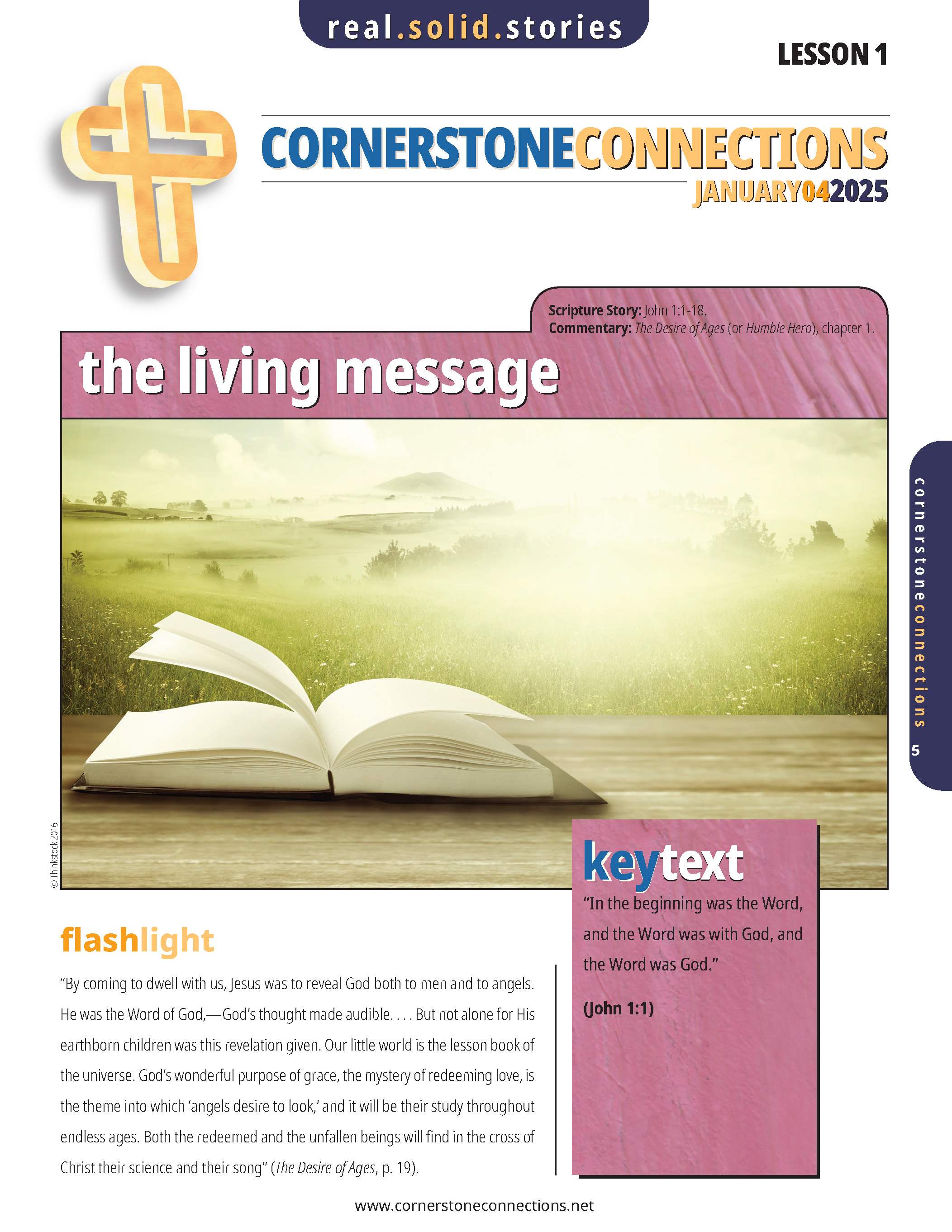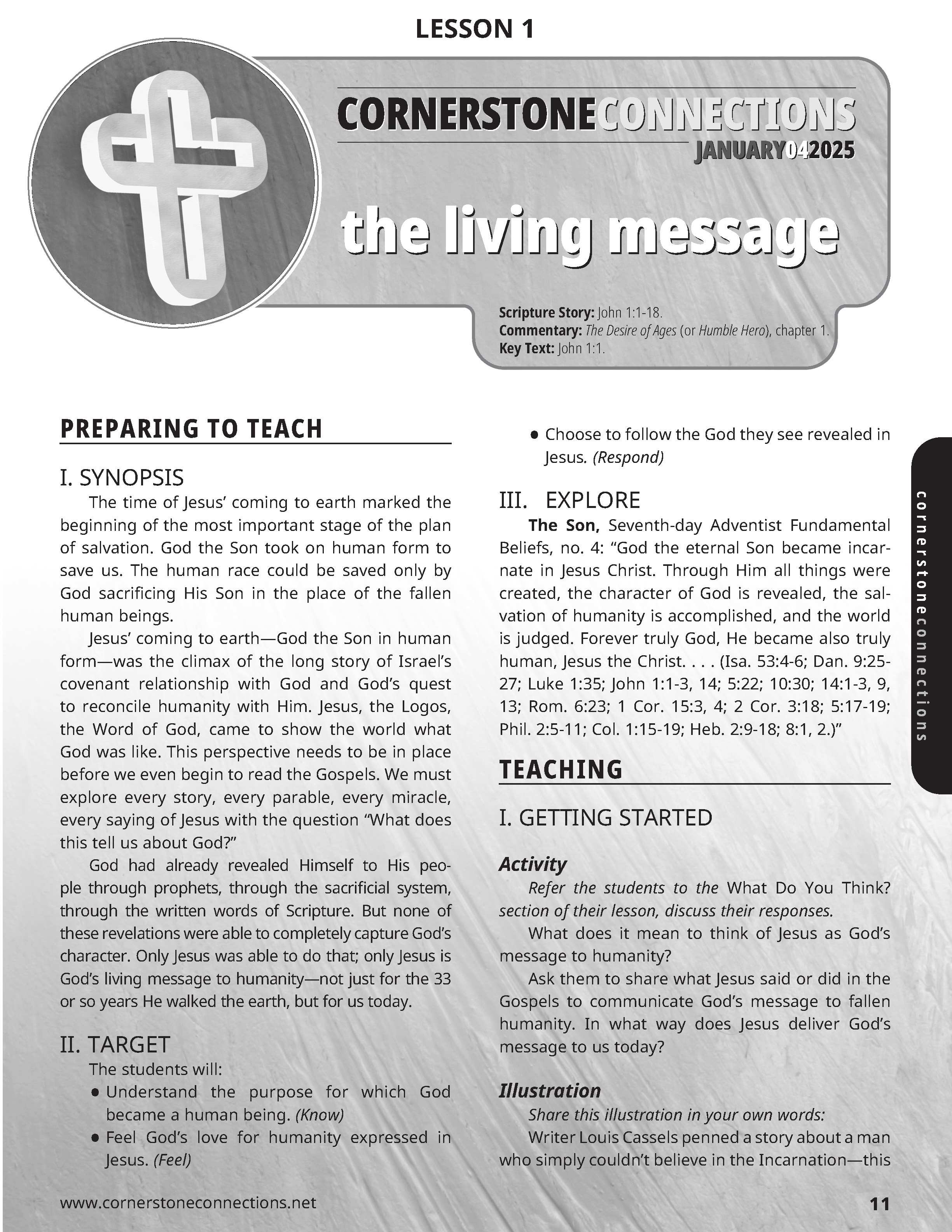Click below to download the Cornerstone Connections leader’s guide and student lesson. This week’s resources also include two lesson plans and a discussion starter video which offer different ways of looking at the topic. Each lesson plan includes opening activities, scripture passages, discussion questions, and real-life applications.
God has revealed Himself to His people through prophets, the Temple system, and through the written Word. But only Jesus can capture what God is really like.
Humble Hero (Desire of Ages)
Chapter 1 - Christ Before Coming to Earth

Do you like surprises? Well, if you were reading the Bible for the very first time, you would be about to get one. Genesis started with creation of light and Matthew starts with, you got it, the creation of Light. Buckle up because the path ahead is going to be filled with intrigue, stories, unusual people, and a whole lot more.
Wow, 2024 was quite a ride! As we step into 2025, we’re filled with excitement and hope for what’s to come. But before we dive into the future, let’s take a moment to reflect on the past year.
Below are a few questions to help spark our conversation and give us a chance to reflect together on the year that was. Let’s get started!
Mathew starts a whole new part of the Bible. The Old Testament was filled with battles, captivity, slavery, promises, desert living, and a plethora of prophecies. The New Testament will be different. Yes, there are stories about angels, demons, dragons, wars, and few prophecies, but it also gives us a front row seat to the life of Jesus and an eclectic group of disciples. In some ways, it is easier to read and understand, but there are still plenty of mysteries to be had.
Read John 1:1-5.
1 In the beginning was the Word, and the Word was with God, and the Word was God. 2 He was with God in the beginning. 3 Through him all things were made; without him nothing was made that has been made. 4 In him was life, and that life was the light of all mankind. 5 The light shines in the darkness, and the darkness has not overcome it.
Read Genesis 1:3-5.
3 And God said, “Let there be light,” and there was light. 4 God saw that the light was good, and he separated the light from the darkness. 5 God called the light “day,” and the darkness he called “night.” And there was evening, and there was morning—the first day.
Read Psalm 119:105.
105 Your word is a lamp for my feet, a light on my path.
Read Psalm 119:130.
130 The unfolding of your words gives light; it gives understanding to the simple.
Read Isaiah 9:6-7.
6 For to us a child is born, to us a son is given, and the government will be on his shoulders.And he will be called Wonderful Counselor, Mighty God, Everlasting Father, Prince of Peace. 7 Of the greatness of his government and peace there will be no end. He will reign on David’s throne and over his kingdom, establishing and upholding it with justice and righteousness from that time on and forever. The zeal of the Lord Almighty will accomplish this.
Read John 1:6-13.
6 There was a man sent from God whose name was John.7 He came as a witness to testify concerning that light, so that through him all might believe. 8 He himself was not the light; he came only as a witness to the light.
9 The true light that gives light to everyone was coming into the world. 10 He was in the world, and though the world was made through him, the world did not recognize him. 11 He came to that which was his own, but his own did not receive him. 12 Yet to all who did receive him, to those who believed in his name, he gave the right to become children of God—13 children born not of natural descent, nor of human decision or a husband’s will, but born of God.
Read John 1:14.
14 The Word became flesh and made his dwelling among us. We have seen his glory, the glory of the one and only Son, who came from the Father, full of grace and truth.
Read John 1:15-18.
15 (John testified concerning him. He cried out, saying, “This is the one I spoke about when I said, ‘He who comes after me has surpassed me because he was before me.’ ”) 16 Out of his fullness we have all received grace in place of grace already given. 17 For the law was given through Moses; grace and truth came through Jesus Christ. 18 No one has ever seen God, but the one and only Son, who is himself God and f is in closest relationship with the Father, has made him known.
How you ever been on a safari? Sometimes the animals are a long way away, but sometimes they are right up close and personal. That’s one of the big differences between the Old and New Testaments. In the Old Testament, God often seems to be far off. Often, He spoke through prophets, who sometimes did really strange things, and sometimes through visions and dreams. In the New Testament, God fulfilled His promise of sending the Messiah to live with us. It went from God being distant to God living down the street in the form of His son Jesus. Which way do you think it would be easier to get to know God? It’s like in person school verses online school. You can get to know the material through online school, but it is much easier when you are in the classroom and can ask the teacher questions, do the experiments in person, and talk to you classmates. Jesus, the Messiah, came to this earth so that you could get to know Him better. Why not make a resolution to spend more time with Him in this New Year?
Change some habits or pick up some new ones. Here are some ideas:

LEADER’S NOTE
For a Relational Bible Study (RBS) you’ll want to get into the Scripture passage and encourage the youth to imagine participating in the story while it’s happening. Then you will be able to better apply it to your own situation today.
You will need to ask God for the Holy Spirit to be present as your small group discusses the questions (no more than 3-6 people in a group is recommended). Start with the opening question. It is a personal question and the answer is unique for each individual. There is no right answer and nobody is an expert here, so don’t be surprised when you hear different responses. You are depending on the Holy Spirit to be present and to speak through your group. Say what God prompts you to say, and listen to what others share.
Take turns reading the chapter out loud. Follow that with giving the students some time to individually mark their responses to the questions (a PDF version of the handout is available as a download). This gives each person a starting point for responding when you start to share as a group. Next, begin the discussion by asking the students to share what they marked and why on each question as you work your way through. Feel free to take more time on some questions than others as discussion warrants.
Encourage each person in the group to apply what is discussed to their personal lives and to share with the group what they believe God wants them to do. Then ask them to pray that God will help each of them to follow through in doing so. Remind them to expect that God will show them ways to live out the message of this passage in the coming week, and that they are free to ask others in the group to help hold them accountable.
With the start of a new calendar year, we’re starting anew with Youth Sabbath School topics. We just finished the Old Testament and this Sabbath marks the start of lessons from the New Testament, beginning with the life of Christ. Not surprisingly, the birth of Christ kicks off the New Testament, although this first lesson actually notes that Christ started way before the world was created. And yet the Creator came as a creation into the world He had previously created. That’s mind boggling in itself!
If the Christmas story is still fresh in your mind from a week or two ago, you won’t find the story of the angels singing to the shepherds or the wise men visiting Jesus in John’s telling of the starting point for Jesus. Instead, fisherman John drew on the Greek word logos to describe Jesus. We might think of Jesus being the “Word of God” but to the Greek mind the logos was the starting point of all thought. It existed at the start of the world and was the dominant reality. Greeks valued the mind, and the logos deals with logic (from the root logos) and the mind. This packs much more meaning than what we give to the term “word.”
Matthew and Luke begin their Gospels with an emphasis on God becoming human. We’ll cover that in the rest of the January Sabbath School lessons. But John’s starting point is just the opposite. He begins with the human, Jesus, as the starting point for all reality. Jesus is the logos. He wasn’t just born on earth in Roman-occupied Palestine. His beginning was the start of all reality. And that reality was God. In fact, Jesus is God!
After establishing that, John shocks his readers by stating that God became human and lived among us. The Message paraphrase renders it, “The Word became flesh and blood and moved into the neighborhood” (John 1:14 MSG). That’s quite different from Zeus and the other gods residing on Mount Olympus and separating themselves from lowly humans. Jesus is the starting point, and He came to hang out with us!
For our relational Bible study this week, we’ll limit ourselves to the first 18 verses of the Gospel of John. Let’s ask the Holy Spirit to connect us to Jesus, the logos, as we delve into Scripture.
How would you describe the start of your life?
Read John 1:1-18.
1 In the beginning was the Word, and the Word was with God, and the Word was God. 2 He was with God in the beginning. 3 Through him all things were made; without him nothing was made that has been made. 4 In him was life, and that life was the light of all mankind. 5 The light shines in the darkness, and the darkness has not overcome it.
6 There was a man sent from God whose name was John. 7 He came as a witness to testify concerning that light, so that through him all might believe. 8 He himself was not the light; he came only as a witness to the light.
9 The true light that gives light to everyone was coming into the world. 10 He was in the world, and though the world was made through him, the world did not recognize him. 11 He came to that which was his own, but his own did not receive him. 12 Yet to all who did receive him, to those who believed in his name, he gave the right to become children of God—13 children born not of natural descent, nor of human decision or a husband’s will, but born of God.
14 The Word became flesh and made his dwelling among us. We have seen his glory, the glory of the one and only Son, who came from the Father, full of grace and truth.
15 (John testified concerning him. He cried out, saying, “This is the one I spoke about when I said, ‘He who comes after me has surpassed me because he was before me.’ ”) 16 Out of his fullness we have all received grace in place of grace already given. 17 For the law was given through Moses; grace and truth came through Jesus Christ. 18 No one has ever seen God, but the one and only Son, who is himself God and is in closest relationship with the Father, has made him known.
1. What starting points have you had in your life?
2. Who or what is “The Word” (John 1:1)?
3. What light does the Word give?
4. Why didn’t the world recognize its Creator?
5. Why did the Word become flesh and dwell among us?
6. What grace did the Word bring us (John 1:14-17)?
7. What has Jesus revealed to you about the invisible God?
8. What does it take for you to accept and believe in Jesus?
What do you find more amazing—that the Jesus who came to earth was actually the God of eternity, or that the God of eternity came to earth as a human in the person of Jesus? Either can boggle one’s mind. Together, both can overload the circuitry of one’s thinking. Jesus wasn’t merely Superman; He was God! God didn’t just come to earth; He came as a fellow human being!
You can follow this down two different pathways. This human being, Jesus, who was God Himself, reveals to us what God is like. What do we now know about God because of Jesus? And once we know that, which feelings arise immediately and which ones flow over time? The rest of our Sabbath School lessons for 2021 will unpack the life of Jesus.
The second pathway is to ponder what’s happening in heaven now that a human being, Jesus, sits on the throne of the universe in heaven right beside God the Father.
Which pathway are you more likely to walk this week?
Here are a few application ideas for you to move from Sabbath School into action this coming week. They relate to one of those two pathways that emerged from reflecting on John 1:1-18. Use these or let them spark additional ways to live out God’s messages to you this week from your study of Scripture with fellow believers.
While the “New Year” for most young people begins with the start of a school year or even the start of summer vacation, perhaps because of the coronavirus pandemic, January 1 might provide a helpful new start to a New Year. Some have new hope because an effective vaccine might finally take us beyond quarantine, shutdowns, and everything being online.
We often think about the Holy Spirit taking our prayers to heaven. Based on today’s Bible study, Jesus knows exactly what it’s like to live as a human being on this earth. So pray “prayers of intercession” through the Holy Spirit to Jesus who’s positioned at the command-and-control center of the universe. Intercede by praying for:




